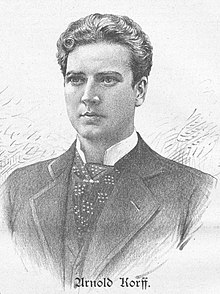Arnold Korff
Arnold Korff ( born August 2, 1870, Arnold PM cherry in Vienna or St. Louis, Missouri, USA, † June 2, 1944 in New York City ) was an Austrian actor.
Life and work
A native of Cherry Arnold worked as a mechanical draftsman and went on until 1894 on American stages. As last U.S. residence prior to his relocation to Europe, he was at Chicago. In June 1896 he left the U.S. and went to Austria - Hungary. There he continued his acting career in the Moravian Proßnitz, further stations were Abbazzia, Olomouc and Vienna, where he played until 1913 at the Burgtheater on Carltheater and 1899. There he received the title of last imperial court actor. When he tried due to high private debt, to put the then Burgtheater director Hugo Thimig with airs and graces and fee receivables under pressure, he was dismissed and replaced by Harry Walden.
On the stage he played both in classics and in folk songs like Anzengruber Perjury Bauer and Nestroys Lumpazivagabundus. In 1902 he stood for the first time in Berlin on the stage, where he appeared regularly from 1914. On May 29, 1905 Korff played in Karl Kraus, held in Vienna Vienna performance of Frank Wedekind's Pandora's Box the scientist Dr. Hilti. In September 1915 he returned via Bergen in Norway back to New York to take up a position with the local Irving Place Theatre. In July 1916 he was back in Germany. Since then he was - at first only sporadically - can also be seen in the film. 1916 was the 46 -year-old made his debut in Feenhände on the side of Henny Porten.
In April 1919 he moved for a few years to Zurich, where he ( until its sale in 1926 ) was hired again as a guest actor on the Peacock Theatre and 1919 the acquaintance of James Joyce, made the evening of Munich's world premiere of exile together with Korff spent in his Zurich apartment in Seefeld, where " Korff and his wife, Joyce and Nora and Ottocaro White [ ... ] excited a telephone call from Munich" expected, as the premiere was run.
Since 1920, he became a regular movie roles and served as lord of the manor of bird Schrey star of the literary adaptation castle Vogelod.
In 1923 he returned temporarily to the United States. Korff was in German silent film of the 20's in demand as a supporting actor, sometimes in batch roles as Friedrich Wilhelm Murnau in Phantom ( 1922). But sometimes he also played supporting roles such as Detective Henry Beaufort in Joe May's Tragedy of Love ( 1923) and as Count Osdorff in GW Pabst's Diary a melodrama Lost ( 1929).
Even in the late summer of 1929 returned Korff - this time for good - back to the U.S., where he participated in several American films. However, hardly his duties came on the batch size also. After the end of his film career, he followed various obligations to Broadway. There you could him since 1935, among other things in the plays Love is Not so Simple, Tapestry in Gray, Lorelei, My Dear Children, Another Sun, Liliom, The Family, Thank You and Svoboda, his last appearance in April 1944, The Searching Wind. seen In the Benatzky Singspiel In the White Horse Inn he played from October 1936 Emperor Franz Joseph.
Arnold Korff died of a heart condition. He had a born in Vienna in 1917 and died in 1992 in Pasadena son of the same name.










